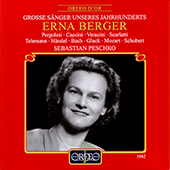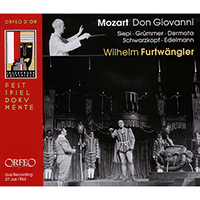Erna Berger
Erna Berger displayed musical talent from a very early age, not only as a singer but also as a pianist and dancer. When she was seventeen she had the opportunity, through a family friend, to sing for the soprano Elisabeth Rethberg who, recognizing her talent, suggested that she join the chorus of the Dresden State Opera, where she would also receive free vocal tuition. This however was not to be. Erna had been left in the care of family relatives in Dresden while her father, a railway engineer, was building railways in Africa; but he now decided to emigrate to Paraguay, taking his family with him. His subsequent death there forced Erna to take a job as a governess, although she was able to return to music and began to sing with a pianist in Montevideo. By the time she was twenty-three she had saved enough money to return to Europe, settling in Dresden. Here she worked in an office while studying in her spare time with Hertha Boeckel and also with Melitta Hirzel (wife of Max Hirzel, a leading tenor at the Dresden State Opera).
In 1925 Berger was engaged by Fritz Busch as a member of the Dresden company, where she made her début as the First Boy/Die Zauberflöte. Her first major rôle was undertaken when she offered to step in for a sick colleague scheduled to sing Olympia in a performance of Les Contes d’Hoffmann; this was followed by the title part in the first performance of Paul Graener’s Hanneles Himmelfahrt in 1927. Other Dresden premières in which Berger participated included Busoni’s Doktor Faust (1925), Richard Strauss’s Die ägyptische Helena (1928) and Max Lothar’s Lord Spleen (1930). Repertoire rôles in which she excelled included Oscar/Un ballo in maschera, Ännchen/Der Freischütz, and Blonde/Die Entführung aus dem Serail, which she also sang at the 1932 Salzburg Festival under Busch. Berger sang as a guest in Pfitzner’s Christelflein at the Berlin Municipal Opera, Charlottenberg, in 1929, later joining this company in 1932, making her début as Oscar. Meanwhile she had appeared at the Bayreuth Festival singing the Shepherd/Tannhäuser with Toscanini in 1930 as well as the Woodbird/Siegfried.
Berger joined the Berlin State Opera in 1934, making her début as Leila/Les Pêcheurs de perles, and stayed with it as a principal for twenty years. She sang over thirty parts with this company, including Gilda/Rigoletto, Mimì/La Bohème, Sophie/Der Rosenkavalier, Zerbinetta/Ariadne auf Naxos and the title rôles in Martha and Madama Butterfly. In addition she frequently appeared as a guest in Hamburg and Munich and, from 1938, with the Vienna State Opera (where she sang Anne Trulove in the local première of Stravinsky’s The Rake’s Progress in 1952). During the 1930s Berger began to sing outside Germany, making her débuts at Covent Garden (1934), Rome (1936), Oslo (1937), Amsterdam (1938) and Brussels (1941), as well as in Barcelona, Bucharest, Copenhagen and Naples. She sang Konstanze/Die Entführung aus dem Serail in the Berlin Sate Opera’s visit to the Paris Opera in 1941.
After the end of World War II Berger was one of the first German musicians to sing internationally once more, to the extent that she became known in Germany as ‘the singing ambassadress’. Between 1946 and 1953 she toured North and South America giving numerous recitals, appearing also in Australia (1948) and Japan (1953). She returned to Covent Garden in 1947 and made her début at the Metropolitan Opera in 1949 as Sophie, also singing Gilda, the Queen of the Night/Die Zauberflöte, the Woodbird/Siegfried and Rosina/Il barbiere di Siviglia there during the 1949–1950 and 1950–1951 seasons. Despite advancing years her voice did not lose its purity, range and beautiful tone: she continued to appear at the Salzburg Festival as late as 1954 (singing Zerlina/Don Giovanni with Wilhelm Furtwängler conducting), retiring from the operatic stage only in 1955 and giving her last song recital in Munich in 1968. Between 1960 and 1971 Berger taught at Hamburg and Essen. She was highly respected by her colleagues; as Furtwängler said: ‘She is music, through and through…the best’. She recorded extensively before, during and after World War II.
© Naxos Rights International Ltd. — David Patmore (A–Z of Singers, Naxos 8.558097-100).


















